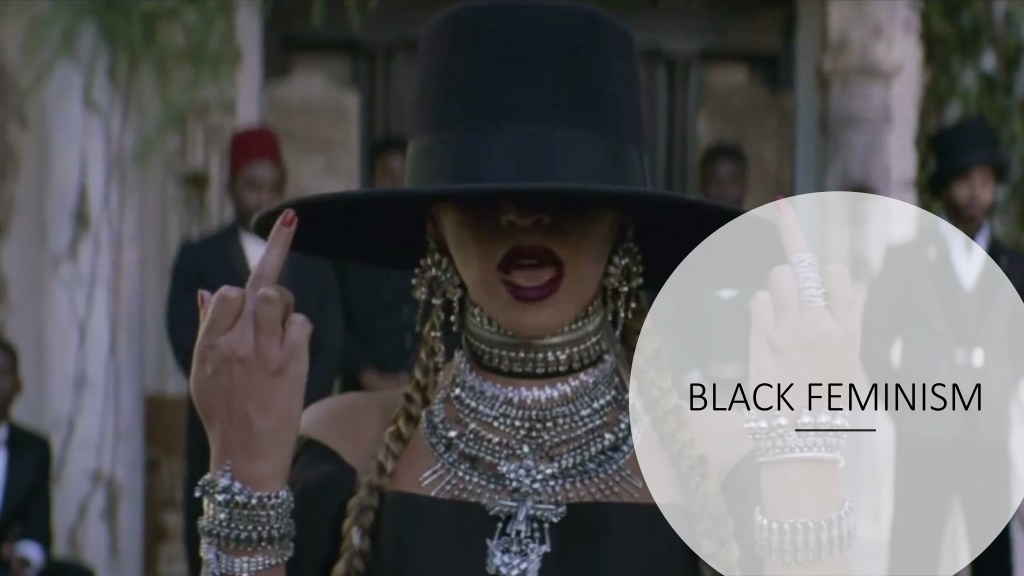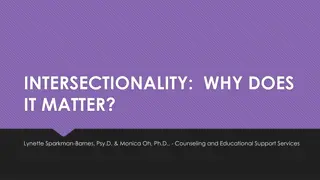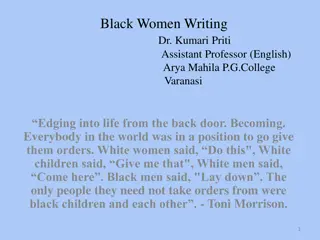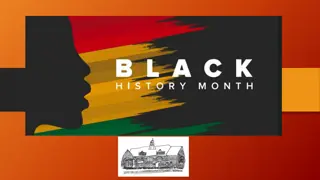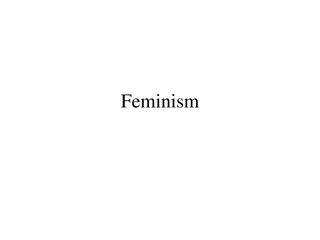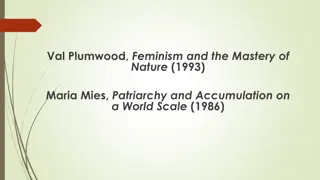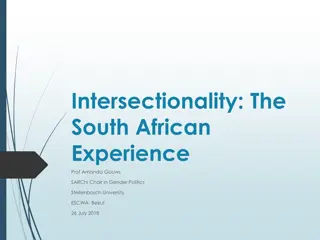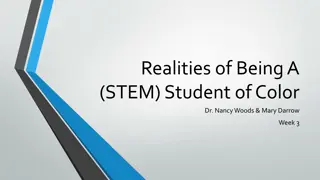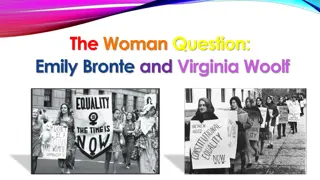Black Feminism: Understanding the Intersectionality of Oppression
Black feminism acknowledges the unique experiences of Black women, who face the intersecting issues of sexism, class oppression, and racism. Originating from the time of slavery, Black feminist leaders like Sojourner Truth and Mary Church Terrell paved the way for advocacy and activism, shaping the principles and actions of the movement. The history of Black feminism highlights struggles for suffrage, racial and sexual violence, and the importance of intersectionality in addressing the complex challenges faced by Black women.
Download Presentation

Please find below an Image/Link to download the presentation.
The content on the website is provided AS IS for your information and personal use only. It may not be sold, licensed, or shared on other websites without obtaining consent from the author. Download presentation by click this link. If you encounter any issues during the download, it is possible that the publisher has removed the file from their server.
E N D
Presentation Transcript
CONTEXT OF BLACK FEMINISM - Black feminism holds that the experience of Black women give rise to a particular understanding of their position in relation to sexism, class oppression, and racism - The experience of being a black woman, it maintains, cannot be grasped in terms of being black or of being a woman, but must be elucidated via intersectionality, a term coined by legal scholar Kimberl Crenshaw in 1989 - A black feminist lens in the United States was first employed by black women to make sense of how white supremacy and patriarchy interacted to inform the particular experiences of enslaved black women -Black activists and intellectuals formed organizations such as the National Association of Coloured Women (NACW) and the National Council of Negro Women (NCNW)
HISTORY OF BLACK FEMINISM - Black feminism has been around since the time of slavery. If defined as a way that black women have sought to understand their position within systems of oppression then this is exemplified in Sojourner Truth's famous speech, "Ain't I a Woman?", which was delivered in 1851 at the Women's Convention in Akron, Ohio - In the post slavery period, black female intellectuals including Sojourner Truth, Anna Julia Cooper, Ida B. Wells, Mary Church Terrell, and Frances Ellen Watkins Harper, set in motion the principles that would become the basis for black feminism -Activists, such as Harper, proposed "some of the most important questions of race, gender, and the work of Reconstruction in the nineteenth century", a very bold action for a black woman at the time - These intellectuals accomplished things that were unheard of for black women, such as giving public lectures, fighting for suffrage, and aiding those in need of help following reconstruction. Suffrage was early evidence of schisms between white and black feminism - According to Harper, white women needed suffrage for education; however, "black women need the vote, not as a form of education, but as a form of protection"
"All women suffer oppression, even white women, particularly poor white women, and especially Indian, Mexican, Puerto Rican, Oriental and Black American women whose oppression is tripled by any of the above- mentioned. But we do have females' oppression in common. This means that we can begin to talk to other women with this common factor and start building links with them and thereby build and transform the revolutionary force we are now beginning to amass." - Mary Ann Weathers HISTORY OF BLACK FEMINISM - 1920s to 1960-Although many wave metaphors of feminist and Civil Rights activism leave out the few decades after the passage of the Nineteenth Amendment to the United States Constitution, this was a particularly important moment in the development of black feminist activism - Other feminist activism and organizing happened around different cases of racial and sexual violence. For example, Esther Cooper and Rosa Parks organized to help Recy Taylor - In 1944, Taylor was the victim of a gang rape; Parks and Cooper attempted to bring the culprits to justice - Black feminist activists focused on other similar cases, such as the 1949 arrest of and then death sentence issued to Rosa Lee Ingram, a victim of sexual violence. Defenders of Ingram included the famous black feminist Mary Church Terrell, who was an octogenarian at the time - During this period, a few radical black female activists joined the Communist party or focused on union activism. Although they did not all identify as feminists, their theorizing included important works that are the foundation for theories of intersectionality integrating race, gender, and class
- The new century has brought about a shift in thinking away from "traditional" feminism - Third-wave feminism claimed the need for more intersectionality in feminist activism and the inclusion of black and other ethnic minority women - This online activism involved the use of "Facebook, Twitter, Instagram, YouTube, Tumblr, and other forms of social media to discuss gender equality and social justice - Third-wave feminism is an iteration of the feminist movement that began in the early 1990s United States and continued until the rise of the fourth wave in the 2010s - Third-wave feminists embraced individualism and diversity and sought to redefine what it meant to be a feminist BLACK FEMINISM- 21 CENTURY
BEYONCE BEYONCE- - FORMATION FORMATION Here s the thing about Beyonc 's Formation : her latest song and video essentially brings the title of Harris book to life. It is ours. It is wholly and undeniable a tribute to Blackness particularly Black girl power. Beyonc is no stranger to feminism. There was her 2011 girl-power anthem Run The World (Girls). A speech on feminism from writer Chimamanda Ngozi Adichie runs through her song, Flawless. Beyonc actually performed in front of the word feminist during her On The Run tour with husband Jay-Z. However, Beyonc 's whole approach to feminism (and Blackness) has always been neutral and restrained. That ended yesterday when her newest song and video dropped - Within the first minute of the video, Beyonc works her southern roots with the use of powerful imagery to praise black women's beauty, like Blue Ivy's afro - The half sunken police car represents the role black women have had historically as the forefront and backbone of political movements - Beyonc embodies the confidence and colorful attitude of a powerful black woman
BEYONCE BEYONCE- - FORMATION FORMATION
